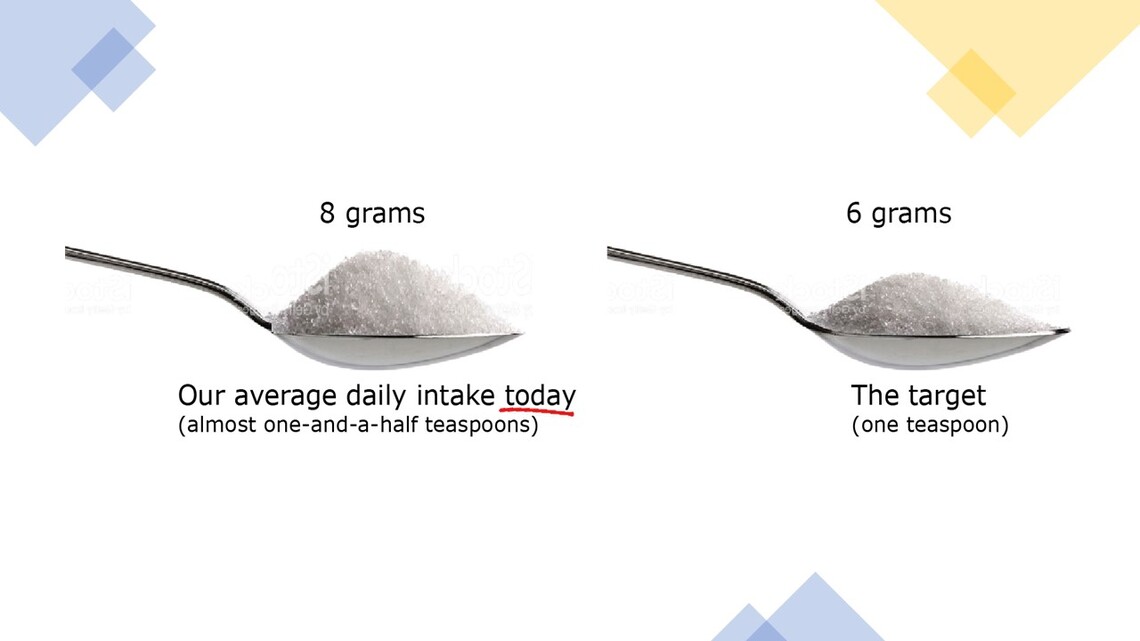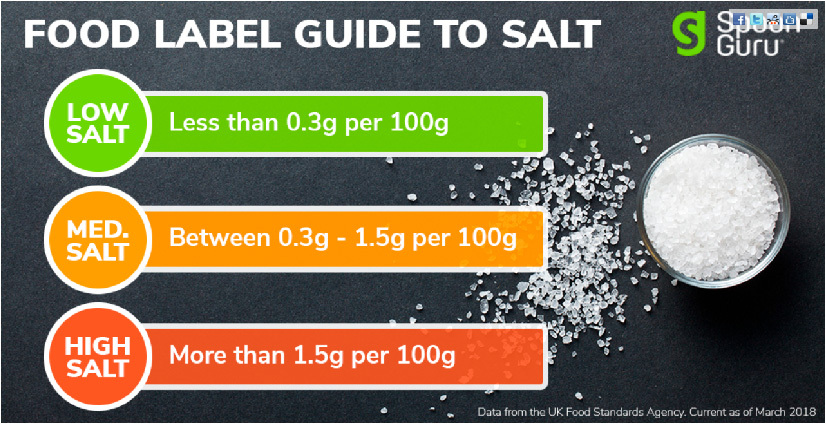In this article we review:
- Why do we need salt?
- How much salt should we be eating?
- What happens if we eat too much salt?
- What happens if we eat too little salt?
- Salt reduction in the UK
- Tips on reducing your salt intake
Why do we need salt?
Over the centuries, salt has been a highly valued commodity, traded and fought over for its unique place in flavouring and preserving our food. Dietary salt is the main source of sodium and chloride ions, which are needed by the human body to perform a range of vital functions:
- optimal nerve and muscle function
- regulating fluids in the body
- regulating blood pH and blood pressure
- helping with the absorption of nutrients in the gut
How much salt should we be eating?
For adults and children aged 11 years and over, the recommended intake of salt is no more than 6 grams/day (2.4 grams of sodium). This is the equivalent of 1 teaspoon. In the UK, the average salt intake is over 8 grams/day according to Food Standards Agency.
Our salt intake not only comes from salt added during cooking or just before eating, but 75% of salt in our diet comes from everyday foods such as bread, cereals, crisps, sauces and processed meats. For instance, two slices of bread can contain 1 gram of salt!
What happens if we eat too much salt?
Too much salt in our diets can lead to water retention in our blood, leading to higher pressure in our blood vessels and causing high blood pressure, which is also known as hypertension (WHO). High blood pressure is a major risk factor for cardiovascular diseases (CVD), and according to the World Health Organisation, CVDs are the leading cause of death worldwide.
The World Research Cancer Fund (WCRF) found strong evidence that consuming salt-preserved foods increases the risk of stomach (gastric) cancer.
High salt intake has also been associated with an increased risk of obesity among children and adults. This risk is independent of energy intake (calories) and other factors such as physical activity and alcohol consumption.
In addition, a high sodium diet can flush calcium from our bones. This heightens the risk of osteoporosis, renal stones, loss of muscle mass and age-related renal failure. However, the most recent evidence for this was from a study published in 2008, so it would be helpful to see more up to date evidence.
What happens if we eat too little salt?
Reducing our salt intake is usually good for our health. For instance, a systematic review and meta-analysis published in the British Medical Journal in 2013 found that a reduction in sodium intake significantly reduces resting blood pressure in both children and adults. Lower sodium intake is also associated with a reduced risk of stroke and fatal coronary health disease in adults.
However, although sodium deficiency is rare, given the high levels of salt in most processed food and the use of salt in our cooking, it can occur, particularly in the elderly, for example where salt is lost through severe diarrhoea and vomiting. The symptoms of sodium deficiency are not usually very specific but can include headaches, vomiting, fainting and fatigue. In the most severe, rare cases, sodium deficiency can lead to more serious consequences such as coma and brain damage. Sodium deficiency is not very common though, and research continues to recommend 6 grams of salt per day as a reasonable daily intake.
Salt reduction in the UK
The UK’s salt reduction programme began in the early 1990s, when the average population intake was about 9 grams/day. The Food Standards Agency (FSA) was given responsibility for the salt reduction programme and issued its first voluntary reduction targets, covering 85 categories of food, to be met by 2010.
However, in 2012, the FSA’s salt reduction programme was moved to the Department of Health’s Public Health Responsibility Deal, which saw no further salt targets set until 2014. These targets were to be achieved by 2017. Following the closing down of the Responsibility Deal, the programme was transferred to Public Health England in 2016. Due to a loss of momentum, however, many companies stopped or slowed their salt reduction efforts, as presented in the 2018 progress report, which states that ‘just over half (52%) of all the average targets set were met by food manufacturers and retailers’.
These delays may help explain why most adults still consume on average more than 8 grams of salt per day. As most of the salt we eat is in the everyday foods we buy, the food industry has a key role in reducing the population’s level of salt intake. Reducing our daily salt intake by 1 gram could prevent more than 4000 premature deaths per year. A recent review suggested that a global implementation of population-wide salt-reduction programmes would be a cost-effective method to lower blood pressure and prevent a range of chronic diseases such as hypertension, CVDs, stomach cancer and osteoporosis. With new salt targets in the UK due in 2020 – for achievement by 2023 – it is important that the government makes salt reduction a key public health priority to prevent such associated diseases.
Tips on reducing your salt intake
The NHS provides some useful tips on how to reduce your salt intake, such as shopping for lower salt foods, cooking with less salt and by making smart choices when you order takeaway food or when you eat out.
You can also use the traffic light labels on food packaging to see whether food has low, medium or high levels of salt. Here’s a handy guide for the salt and sodium levels per 100 grams of food, to help you manage your salt intake.
Conclusions
- We all need some salt to stay healthy. The recommendation is about 6 grams (about one teaspoon) per day. On average, we currently consume over 8 grams of salt per day.
- We should eat less processed food, as this is often the main source of salt in our diet.
- A lower salt diet (as well as consuming less fat and sugar) can reduce the risk of a range of illnesses, from heart disease and stroke to osteoporosis and kidney failure.
- Try to add less salt during cooking; use herbs and spices instead.
- Try to opt for lower salt products when buying food and condiments, as well as when ordering takeaways or eating out.
Other relevant articles on the Age Watch website:
- Diet: Salt, Sugar and Fat
- Diet: Diet - A diet that works for you
- Illnesses: Bone Diseases in the Elderly (e.g. osteoporosis)
Reviewed and published May 2020. Next review date April 2024.


